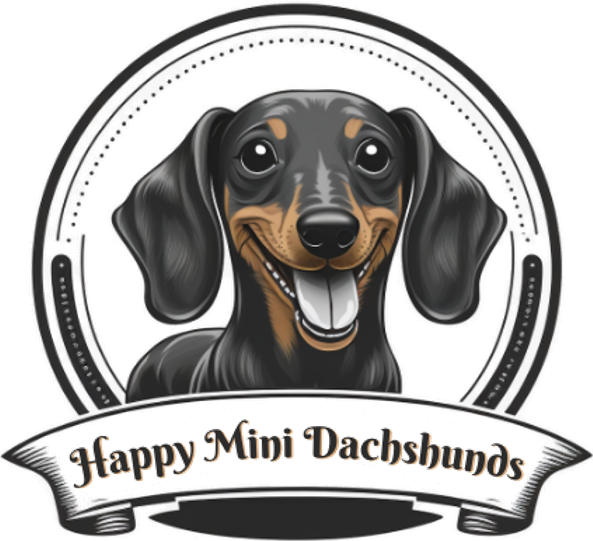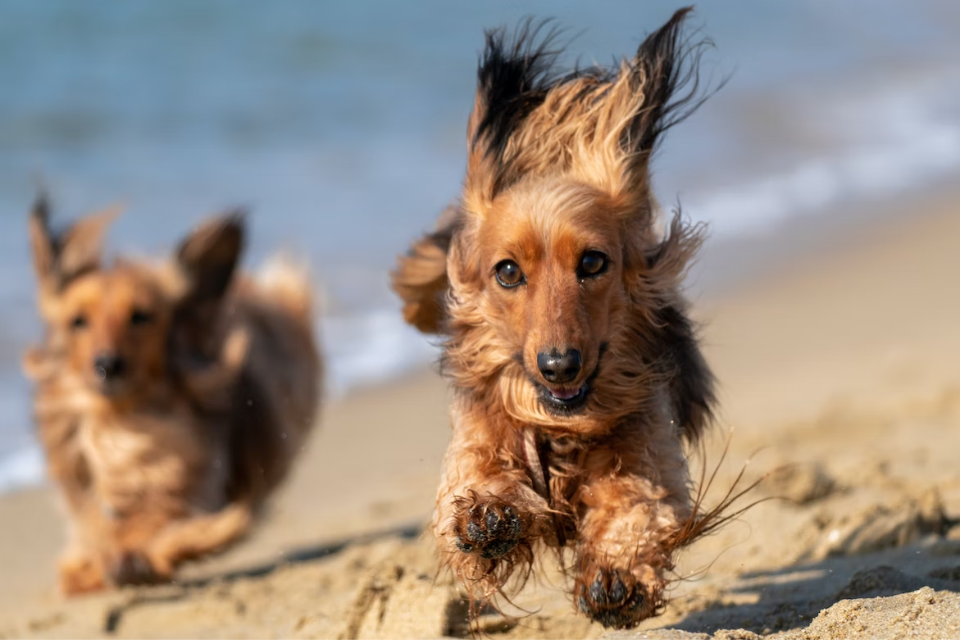If you’re a mini dachshund owner or considering bringing one home, you might have heard people say that they’re hyperactive. As a mini dachshund owner myself, I can understand why this is a common perception. These tiny pups are full of energy, and they love to run around and play. However, hyperactivity in mini dachshunds is not necessarily a given. In fact, it’s often the result of a lack of proper care and attention.
In this article, we’ll explore the question of whether mini dachshunds are hyper-in-depth. We’ll examine the factors that can contribute to hyperactivity, the signs to look out for, and the steps you can take to manage and prevent it. Whether you’re a new mini dachshund owner or have had one for years, this article will provide you with the knowledge and tools you need to ensure that your furry friend is happy, healthy, and well-behaved.
As a proud owner of a mini dachshund, I have seen firsthand how these dogs can be both loving companions and a handful of energy. But with the right care and attention, you can manage their high spirits and enjoy the unique personality and loyalty that mini dachshunds bring to any household. So, let’s dive in and explore the fascinating world of mini dachshunds and their hyperactivity!
Key Takeaways:
- Hyperactivity is common in mini dachshunds due to their breed traits, but it can also be caused by other factors such as diet and lack of exercise.
- Signs of hyperactivity in mini dachshunds include excessive barking, restlessness, and destructive behavior.
- To manage and prevent hyperactivity in your mini dachshund, it’s important to establish a routine, provide plenty of exercise and mental stimulation, and consult with a veterinarian if necessary.
What causes hyperactivity in mini dachshunds
If you’ve ever owned a mini dachshund, you know they’re a breed that is full of life and energy. But when that energy becomes excessive, it can lead to hyperactivity, which can be a problem for both the dog and its owner. In this section, we’ll explore the various factors that can contribute to hyperactivity in mini dachshunds.
Genetics
One of the most common causes of hyperactivity in mini dachshunds is their genetics. Dachshunds were originally bred as hunting dogs, and their natural instincts to chase and dig can manifest in hyperactivity when they’re not given an outlet for their energy. Additionally, some mini dachshunds may have a genetic predisposition to anxiety or hyperactivity, which can contribute to their behavior.
Lack of exercise
Another major factor that can lead to hyperactivity in mini dachshunds is a lack of exercise. Mini dachshunds need plenty of physical activity to burn off their energy and stay healthy. Without enough exercise, they can become bored and restless, which can lead to destructive behavior and hyperactivity.
Boredom
Mini dachshunds are smart and curious dogs that need plenty of mental stimulation to keep them engaged. If they don’t get enough stimulation, they can become bored and restless, which can lead to hyperactivity. This can happen if they’re left alone for long periods without any toys or activities to keep them occupied.
Separation anxiety
Mini dachshunds are known for their loyalty and attachment to their owners. When they’re separated from their owners for too long, they can experience separation anxiety, which can lead to hyperactivity. This can be especially common in mini dachshunds that are left alone for long periods, such as those that are kept in a crate or left in a backyard all day.
Health issues
Finally, certain health issues can contribute to hyperactivity in mini dachshunds. For example, thyroid issues, allergies, or other health problems can cause discomfort and restlessness, leading to hyperactivity. If you notice that your mini dachshund is excessively hyper, it’s a good idea to take them to the vet for a checkup to rule out any underlying health issues.
As a mini dachshund owner, I’ve experienced firsthand the effects of hyperactivity in my dogs. From destructive behavior to non-stop barking, I know how frustrating it can be to deal with a hyperactive mini dachshund. However, by understanding the factors that can contribute to hyperactivity, you can take steps to manage and prevent it in your furry friend. In the next section, we’ll explore the signs of hyperactivity to look out for in your mini dachshund.
Signs of hyperactivity in mini dachshunds
It’s important to recognize the signs of hyperactivity in your mini dachshund in order to determine the best course of action. Some common signs of hyperactivity in mini dachshunds include:
- Excessive barking: Mini dachshunds are known for being vocal, but excessive barking can be a sign of hyperactivity.
- Chewing and destruction: Mini dachshunds have a natural instinct to chew, but excessive chewing and destruction of furniture or household items can be a sign of hyperactivity.
- Jumping and running: Mini dachshunds are energetic dogs, but excessive jumping and running can be a sign of hyperactivity.
- Inability to settle down: Hyperactive mini dachshunds may have difficulty relaxing or settling down, even when tired.
- Constant movement: Mini dachshunds with hyperactivity may be constantly moving, pacing, or circling.
If you notice any of these signs in your mini dachshund, it’s important to address the behavior as soon as possible to prevent it from becoming a habit. Consistent training and exercise can help to alleviate hyperactivity and promote a calmer, more relaxed demeanor in your mini dachshund.
As a mini dachshund owner, I’ve noticed that my dog can exhibit some of these signs of hyperactivity when he’s not getting enough exercise or attention. For example, he may bark excessively or chew on things he shouldn’t if he’s feeling bored or neglected. By providing him with regular exercise and training, I’ve been able to keep his hyperactivity under control and enjoy a more peaceful home environment.
Related: Are Mini Dachshunds Lazy?
How to deal with hyperactivity in mini dachshunds
If you’re a mini dachshund owner, you know how challenging it can be to deal with a hyperactive pup. Here are some tips to help you manage your mini dachshund’s hyperactivity:
- Provide enough exercise: Mini dachshunds need plenty of exercise to burn off their energy. Take your mini dachshund for daily walks or runs in the park. You can also play fetch or tug-of-war in the backyard or in your home.
- Provide enough mental stimulation: Mini dachshunds also need mental stimulation to keep their minds occupied. Provide them with puzzle toys or hide treats for them to find.
- Positive reinforcement: Reward good behavior with treats or praise. Mini dachshunds respond well to positive reinforcement, so be sure to let them know when they’ve done something right.
- Training: Mini dachshunds need proper training to learn how to behave properly. Consider enrolling them in obedience classes or working with a professional trainer to help them learn good manners.
- Consistency: Consistency is key when dealing with a hyperactive mini dachshund. Establish a routine and stick to it. Be consistent with rules, commands, and training techniques.
- Manage their environment: Make sure your mini dachshund has a safe and secure environment to play and rest. Remove any potential hazards and provide them with a cozy bed and toys.
- Seek professional help: If your mini dachshund’s hyperactivity is severe and unmanageable, seek help from a veterinarian or animal behaviorist.
By following these tips, you can help manage your mini dachshund’s hyperactivity and create a happy and healthy environment for your furry friend.
Related: Are Miniature Dachshunds Loud?
Prevention of hyperactivity in mini dachshunds
Preventing hyperactivity in mini dachshunds can be challenging but not impossible. It involves ensuring that your dog gets adequate exercise, socialization, and mental stimulation. Below are some tips for preventing hyperactivity in your mini dachshund:
- Provide adequate exercise: As a mini dachshund owner, I have found that providing regular exercise is one of the best ways to prevent hyperactivity. Mini dachshunds are energetic dogs that require daily exercise to keep them physically and mentally fit. Aim for at least 20-30 minutes of brisk walking or playtime each day.
- Socialize your dog: Socializing your mini dachshund is crucial to prevent hyperactivity. This involves exposing your dog to new people, animals, and environments regularly. The more your dog is exposed to different stimuli, the less likely they are to become hyperactive or anxious.
- Provide mental stimulation: Mental stimulation is equally important for mini dachshunds. Engage your dog in interactive games, puzzles, and toys that require problem-solving skills. This will not only prevent hyperactivity but also help to alleviate boredom.
- Create a calm environment: Mini dachshunds are sensitive to their environment, and a chaotic or stressful environment can trigger hyperactivity. Create a calm and structured environment by providing your dog with a designated sleeping area, sticking to a regular feeding schedule, and minimizing loud noises.
- Training and discipline: Proper training and discipline are essential for preventing hyperactivity in mini dachshunds. Consistently reward good behavior and redirect undesirable behavior with positive reinforcement techniques. Avoid using punishment as this can exacerbate hyperactivity and anxiety.
As a mini dachshund owner, I have found that the above tips have helped prevent hyperactivity in my dog. By providing regular exercise, socialization, mental stimulation, a calm environment, and proper training, you can prevent hyperactivity in your mini dachshund and ensure a happy and healthy dog.
Conclusion
In conclusion, hyperactivity in mini dachshunds is a common issue that can be caused by various factors such as genetics, lack of exercise, and boredom. Some of the signs of hyperactivity in mini dachshunds include excessive barking, chewing, digging, and jumping. It is essential for owners to take action and deal with hyperactivity in their pets to ensure their well-being.
There are several ways to deal with hyperactivity in mini dachshunds, including providing regular exercise, mental stimulation, and positive reinforcement training. In severe cases, medication or professional behavior modification may be necessary. Prevention of hyperactivity can also be achieved through early socialization and training, regular exercise, and ensuring a stimulating environment.
As a mini dachshund owner, I have personally experienced the challenges of dealing with hyperactivity in my furry friend. Through patience, consistency, and plenty of exercise and training, we were able to address his hyperactivity and improve his overall behavior and well-being.
In summary, understanding the causes, signs, and ways to deal with hyperactivity in mini dachshunds is crucial for their physical and mental health. By taking proactive steps, owners can ensure their pets lead happy and healthy lives.

